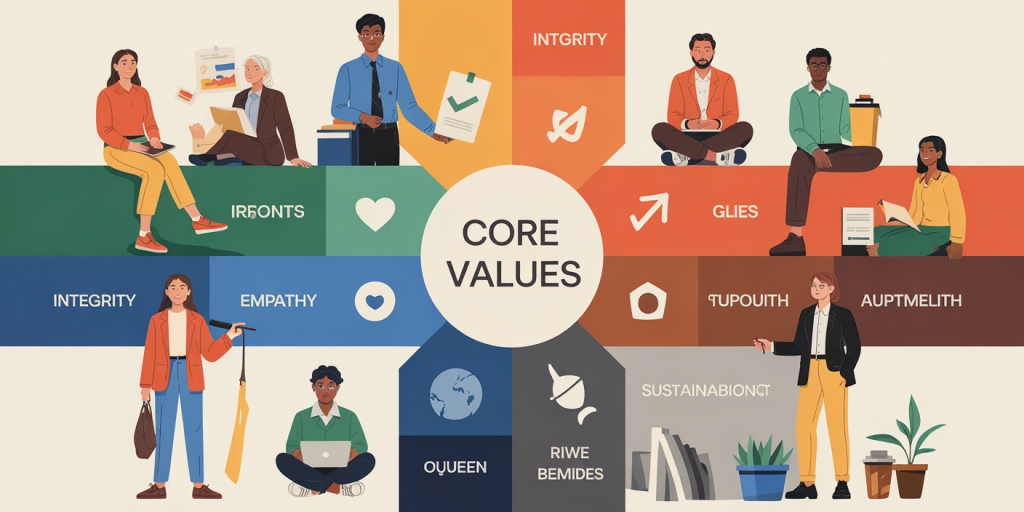Why You Should Define Your Core Values (And How to Do It)
In today’s fast-paced and ever-changing environment, defining your core values has become more crucial than ever before. Whether you are an individual striving for personal growth or a leader guiding an organization, core values act as the compass that directs decisions, behaviors, and goals. These fundamental beliefs not only help maintain consistency and integrity but also foster trust, motivation, and alignment among stakeholders.

Statistics reveal that organizations with clearly defined core values experience 29% higher employee engagement and report 20% greater customer satisfaction rates (Gallup, 2022). On a personal level, individuals aware of their values are 36% more likely to report a greater sense of life satisfaction and purpose (Harvard Study of Adult Development, 2020). This article explores why defining core values is indispensable and provides actionable strategies to help you identify and implement them effectively.
The Significance of Core Values in Personal and Professional Growth
Core values are the essential beliefs and principles that influence your attitudes and actions. They form the foundation upon which decisions are made, setting boundaries and priorities, both privately and in business contexts. Without clearly articulated values, decision-making often becomes inconsistent, which can lead to confusion, conflict, and inefficiency.
Consider the example of Patagonia, the outdoor clothing company known for its commitment to environmental sustainability. Patagonia’s core value of environmental responsibility has shaped everything from its supply chain to marketing strategies, enabling it to build a loyal customer base and a positive brand image. In contrast, companies lacking a strong values-driven culture often face internal fragmentation and low employee morale.

On a personal level, defining core values enables individuals to live authentically and purposefully. Take the case of Oprah Winfrey, whose commitment to empathy, integrity, and empowerment has driven both her career decisions and philanthropic efforts. Such clarity fosters resilience and clarity during challenging times, as individuals or organizations can refer back to their core principles to guide actions.
Enhancing Decision-Making Through Core Values
One of the most immediate benefits of defining your core values is improved decision-making. When confronted with complex choices, a clear set of values simplifies the process by acting as a decision filter. For example, if “honesty” is a core value, you are more likely to prioritize transparency, even when it is difficult.
This can be illustrated by the case of Johnson & Johnson during the 1982 Tylenol cyanide crisis. The company adhered to its core values of consumer safety and responsibility, recalling all products and openly communicating with the public. The result was not only a restoration of trust but also long-term brand loyalty—highlighting how values can shape critical decisions effectively.

A comparative table below illustrates how values-driven versus values-ambiguous approaches impact decision outcomes:
| Aspect | Values-Driven Approach | Values-Ambiguous Approach |
|---|---|---|
| Decision Consistency | High, aligned with principles | Low, often reactive and inconsistent |
| Stakeholder Trust | Builds and maintains | Erodes over time |
| Employee Engagement | Motivates and aligns | Confuses and demotivates |
| Brand Reputation | Strengthens | Vulnerable to scandals |
Data from a Deloitte survey (2023) supports these observations, showing that 87% of organizations with clearly communicated core values report higher ethical standards in business decisions, compared to only 42% in organizations without clear values.
Building Stronger Relationships and Culture
Defining core values fosters stronger relationships and cultural cohesion. Values create a shared language and understanding between individuals, teams, and organizations, transforming abstract ideals into concrete behaviors. This alignment improves communication, collaboration, and conflict resolution.
For example, Zappos, the online shoe retailer, has core values like “Deliver WOW Through Service” and “Create Fun and A Little Weirdness.” These values are deeply ingrained in hiring, training, and employee evaluation processes, resulting in exceptional customer service and a highly engaged workforce. The company’s culture is often cited as a major reason for its success and strong brand loyalty.
On a personal level, individuals who clearly define and communicate their values often experience deeper and more genuine relationships. Research by the Pew Research Center (2021) found that 78% of respondents in fulfilling friendships shared core values such as trustworthiness, kindness, and respect, underscoring the role values play in relationship satisfaction.
How to Effectively Define Your Core Values
Defining core values requires introspection, honesty, and openness. The process should be deliberate and revisited periodically to ensure it grows with experience and changing circumstances. Here are practical steps to help you discover and articulate your core values:
1. Reflect on Peak Moments: Identify moments in your life or organization when you felt most fulfilled or proud. Analyze what values were present or being honored at those times. 2. Identify Role Models: Consider people you admire and the qualities they exhibit. These admired traits often reflect values important to you.
3. List and Prioritize: Write down potential values and prioritize them based on their resonance and importance. Avoid cliches; instead, focus on what genuinely drives you.
4. Test Against Reality: Examine your current behavior and decisions to see if they align with the chosen values. Adjust as needed to ensure authenticity.
5. Write Clear Statements: Express your core values in simple, clear language. For organizations, involve team members in this process to foster buy-in.
An example exercise: a mid-sized tech company conducted workshops where employees shared stories about proud moments and values. The result was a refined list of five core values—Innovation, Integrity, Inclusion, Customer-Centricity, and Sustainability—that now guide strategic decisions and everyday actions alike.
Integrating Core Values Into Everyday Life and Business
Knowing your core values is only the beginning—the next challenge is actively integrating them into daily routines and strategic frameworks. For individuals, this might involve regular self-check-ins to ensure actions align with values like “balance” or “growth.” Practically, this could mean setting boundaries on work hours or pursuing continuous learning opportunities.
Organizations can embed values into performance reviews, hiring criteria, and communication channels. For instance, Cisco attributes part of its success to integrating values like collaboration and innovation into its leadership development and operational processes. This alignment has contributed to a 27% improvement in employee retention and enhanced business agility (Cisco Annual Report, 2023).
A comparison of integration strategies:
| Strategy | Personal Application | Organizational Application |
|---|---|---|
| Goal Setting | Align goals with values | Tie OKRs (Objectives and Key Results) to core values |
| Behavior Modeling | Practice values daily | Leaders role-model values |
| Accountability | Use journaling and self-reflection | Performance appraisals tied to values adherence |
| Communication | Share values openly with close networks | Incorporate values into all communications |
Looking Ahead: The Future Impact of Defined Core Values
As societal expectations and markets evolve, having clearly defined core values will become an even stronger determinant of success and sustainability. Increasingly, consumers and employees seek authenticity and ethical behavior, making transparent values a competitive advantage.
Emerging research indicates that companies with robust value systems are 35% more likely to outperform competitors in innovation and growth over five years (MIT Sloan Management Review, 2024). On a societal level, a collective emphasis on core values such as equity, transparency, and environmental stewardship promises to drive positive systemic change.
For individuals, continual engagement with evolving values can foster adaptability, lifelong fulfillment, and resilience amidst uncertainty. Values will increasingly serve as anchors in navigating complex global challenges, enabling clearer purpose-driven lives and careers.
In both personal and professional realms, the ongoing refinement and application of core values will remain essential for building meaningful relationships, guiding ethical decisions, and achieving impactful outcomes in the future.
By understanding the powerful role of core values and learning how to define and embed them systematically, you position yourself or your organization for sustainable success and fulfillment. Begin the journey today to clarify what matters most and watch as your decisions, culture, and relationships align more harmoniously with your true purpose and vision.
